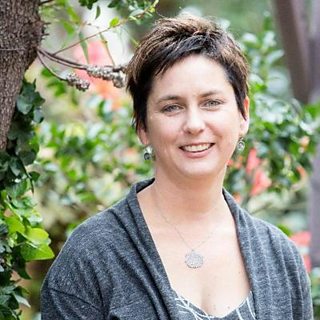Most women entering the ����ý in the earlier decades were automatically channelled into a career path that was assumed to be more suited to feminine capabilities and disposition. As the organisation grew, so did the army of typists, telephonists, filing clerks, and secretaries, without whom the Corporation could not have functioned.
From the 1970s these gendered career paths were challenged by women employees agitating for improved conditions and opportunities.
Dorothy Torry entered the ����ý in 1936, aged 19, and started in the General Office, where typists "were taught about the ����ý and the charter and impartiality and the ethos generally", before being "farmed out to anybody who wanted extra secretarial help".
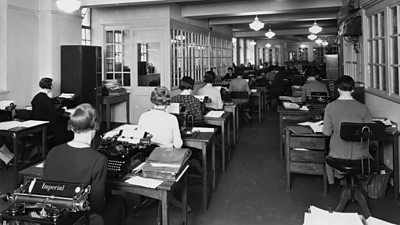
Torry soon moved to the Director-General's office as the most junior of John Reith's four secretaries. Torry remembered Reith as "a great inspiration" and "an absolutely marvellous fellow because he talked to his secretaries, you know, discussed things with them."
She also worked for William Haley, rising to 'number 1 secretary' and Clerk to the Board by 1947. In this interview Torry recalls the complexity of her role, and reveals that Haley involved her in decision-making:
As secretary to the Director-General Charles Curran from 1969, Rosemary Haynes helped maintain the security of information. As Haynes recalled in her ����ý oral history interview, confidential correspondence was kept "contained within the office", assisted by the reliance on "manual typewriters, no photocopiers".
Four personal secretaries were still required to manage the "absolutely phenomenal" volume of work, including typing a letter from the Director-General to any staff who had completed twenty-five years' service:
"There were an awful lot then, of course, because people came in for a lifetime. There were lots and lots of people who did forty years. Those, of course, not only had their letter but they came in personally to have tea or drinks with the D-G and shake hands. But the twenty-five year service letters, again, took up an enormous amount of time and while drafts were provided, again, he would often personalise them.
But I can remember typing I think in one day twenty-five of those letters, along with everything else. And remember, these were old manual typewriters and you were not allowed to make mistakes. No Tippex, no rubbers or whatever, so if it went wrong you started again. So a huge amount of correspondence. But of course, apart from that, we needed four secretaries because we, in those days, did everything – looked after all the Governors' arrangements, all the Board of Management arrangements.
Everything that is now done by the Secretary's office was done in the D-G's office. Typing and distribution of Board of Management papers, absolutely everything. And also the arrangement of the D-G's quarterly liaison meeting, which again was generally held at Television Centre, but all that was done by our office and also the actual proceedings because tape recorders weren’t allowed so somebody had to record in shorthand, verbatim, everything that was said and then do the transcript and circulate it. So the volume of work was absolutely phenomenal." - Rosemary Haynes interviewed by Frank Gilllard, 1996. From the ����ý Oral History Collection.
In the early days, dress and behaviour of all female staff was closely monitored by the Women's Staff Supervisor, a position held by Gwyneth Freeman from 1931 to 1942.
Torry recalled that Freeman "stood in the hall on occasions to see how we were dressed when we arrived and if girls came in without stockings, they were sent away to put them on".
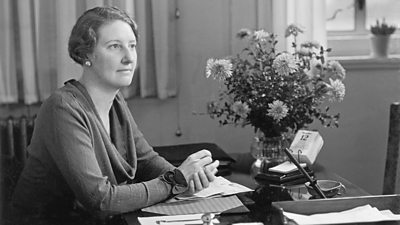
Even though women entering the organisation were rarely employed beyond a secretarial position, the ����ý offered the prospect of advancement to higher-status, higher-paid positions in an interesting environment.
In 1935, Clare Lawson Dick jumped at the chance to work as a temporary registry clerk, despite her good education and previous work experience.
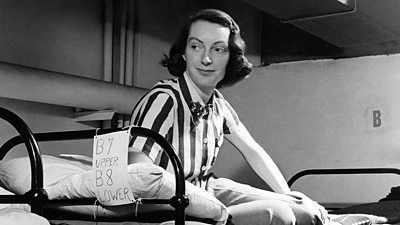
The caption for this photograph, taken during the Second World War, notes Lawson Dick's status as "the first woman in the ����ý to come to work wearing trousers". Forty years after she had started at the Corporation, in 1975, Clare Lawson Dick achieved something far more notable - she became the first female Controller of ����ý Radio 4.
Margaret Douglas joined the ����ý in 1951 at the lowest secretarial grade, as a drama bookings secretary in Radio. Douglas then moved to Television as a Production Secretary on Panorama. Like other production secretaries, Douglas was the programme's linchpin:
"Douglas became the princess of Panorama, the right hand of the producer in the gallery, and in the office, the wiper of noses, the stroker of egos, the calmer of the frightened and the corrector of the inept. She was the woman who had to know everything and then next morning be first in the office to do the paper-work and clear up the emotional and physical wreckage of the night before." - The Independent, 25 August 2008
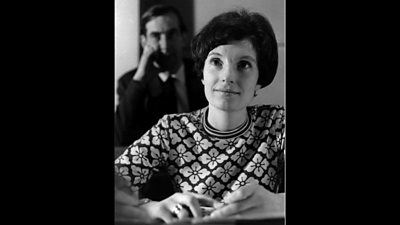
After working as a researcher, director, producer and editor, Douglas was appointed in 1983 as Chief Assistant to the Director-General Alisdair Milne, one of the most senior jobs in the corporation.
The ����ý expanded rapidly during the Second World War, but it became more difficult to recruit the 'right' women, as many preferred to do war work instead. A Secretarial Training School was established in 1942 in an effort to address this issue. In the 1960s the school was still training over a thousand women a year.
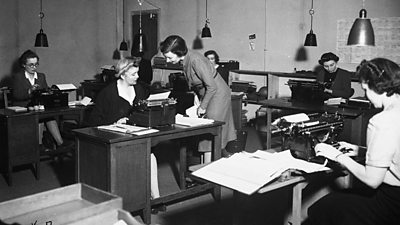
By 1973 the Corporation was facing a secretarial shortage, despite an extensive advertising campaign and appeals to schools.
In the staff journal Ariel, Tony Ashton, the Head of Appointments, appealed "to girls already in the ����ý" to help with recruiting, noting that the organisation had trouble keeping secretaries once they had joined: "Some tend to find the ����ý not as glamorous as they had thought and others may leave because they are not given enough responsibility."
This prompted a flood of letters, with most respondents pointing out the poor remuneration and career advancement opportunities for secretaries. "There are two very simple solutions", wrote Reva Landau in March 1973. The first is to "immediately raise ����ý salaries to comparable levels" with other companies.
The second is for the ����ý to start practising what it claims is its policy of promotion of secretaries and producers' assistants…. Prospective secretaries would have to be told by their friends in the ����ý that regardless of education (often university or 'A' level), ability, or hard work, that they have very little chance of promotion in the field of their choice, and at the age when men are being promoted to higher positions. Let the ����ý start promoting secretaries in the way it claims to do, and it will have no problems recruiting and holding secretaries.
Ariel, 9 March 1973
The internal report of 1973 found that virtually all of the 2000 secretaries and 500 television producer's assistants were women. Demands for better wages, conditions and career advancement gathered steam, following the passing of anti-discrimination and equal pay legislation in the mid-1970s, and reports on the ����ý's treatment of female employees.
In the 1980s, various schemes were put in place to create more opportunities for women in secretarial grades, and to change perceptions of those positions as 'female', but progress was slow.
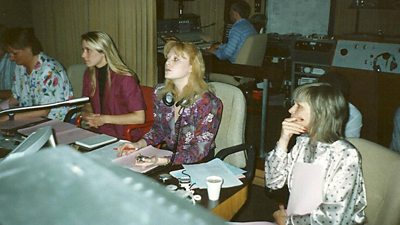
A ����ý job evaluation scheme in 1986 showed that radio production secretaries were underpaid and should be upgraded to reflect their contribution to programme making, and the position was renamed production assistant, in line with their television counterparts.
The following year, 400 radio production assistants went on strike for better wages - and won.
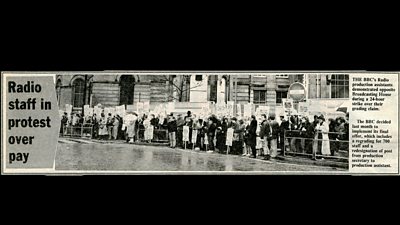
These newly-released oral histories and archival documents reveal the significance and diversity of support roles, as well as women employees' long battle to have the essential nature of their roles reflected in reasonable pay and conditions.
Further Reading
- Dr. Kate Murphy, Behind the Wireless: A History of Early Women at the ����ý (London: Palgrave Macmillan, 2016)

